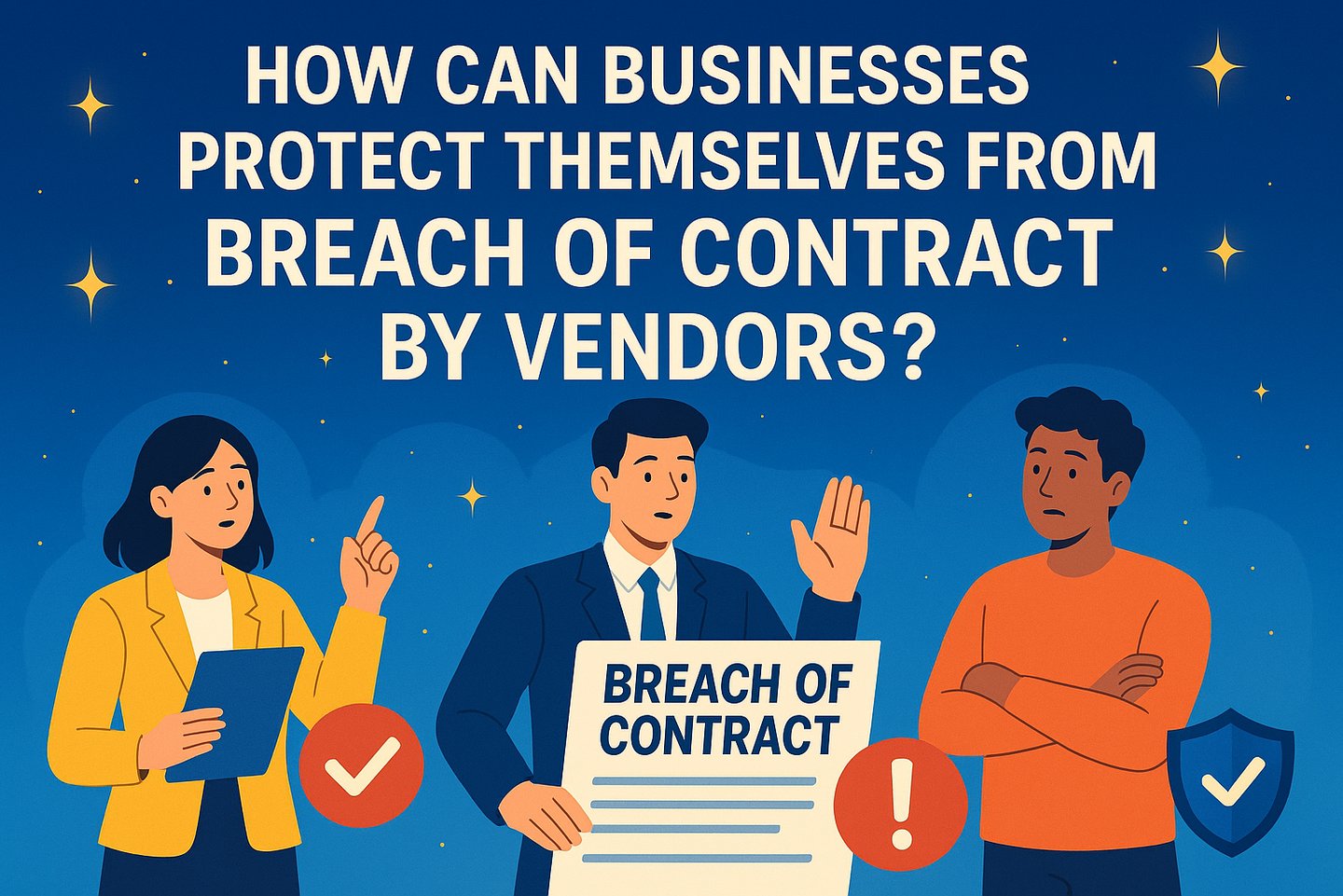How Can Businesses Protect Themselves from Breach of Contract by Vendors?
Businesses are dependent on vendors for a smooth supply of goods and services. However, breach of contract can lead to delays, financial loss, and reputational harm. These risks can be mitigated by adopting proactive measures such as precise contract drafting, vendor due diligence, consistent compliance monitoring, and effective dispute resolution strategies.
CORPORATE LAWS
Khushi Dadhich
10/28/20253 min read


INTRODUCTION
Amid an increasingly interconnected economy, it is not possible for businesses to operate in isolation. They rely on vendors for everything, such as raw materials, transport, logistics, IT support, and other important functions. These partnerships make projects efficient and cost-effective, but sometimes certain risks are also associated, such as breach of contract with such partnerships. Failure of a vendor to deliver on time, supply standard goods, or terminate agreements can significantly impact the business of the buyer. To deal with such issues, businesses must adopt adequate measures such as strong contract drafting, adding legal protection, performance monitoring, and better dispute resolution techniques before they escalate to litigation.
IMPORTANCE OF VENDOR CONTRACTS
A vendor contract is not a mere formality of law but a basis of trust and accountability. It establishes expectations, duties, timelines, and remedies for non-performance. A weak or vague contract creates scope for interpretation, and vendors are likely to take advantage of it. Therefore, companies should treat vendor contracts as risk management vehicles rather than transactional agreements.
CONDUCTING DUE DILIGENCE BEFORE CONTRACTING
Prior to entering into contracts, companies should properly conduct due diligence on potential suppliers. This involves:
- Credit checks to guarantee stability and solvency.
- Reputation analysis in the form of market credibility and previous client references.
- Checks for compliance with related industry standards, rules, and certifications.
- Litigation records in order to assess whether the supplier has a history of disputes or violations.
By screening out dodgy suppliers in the first place, businesses minimize the likelihood of contract breaches down the line.
DRAFTING CLEAR AND COMPREHENSIVE CONTRACTS
The contract remains one of the biggest shields against breaches. For greater enforceability, the execution of contracts should have the following:
1. Delivery means should be plainly stated—specifications, quality, and time.
2. Deliver penalties for nonperformance—to be implemented through a service-level-agreement (SLA), for instance, or through penalties in cases of delay or inferior delivery.
3. In the event of loss or damages caused by breach, indemnify the losses.
4. Payment terms should also be stated, including milestones on satisfactory performance.
5. Add clauses concerning confidentiality and intellectual property, especially when sensitive information presents itself.
6. A way should be found to allow parties to get out of the agreement together—their rights to terminate with notice and obligations on termination.
A clear contract helps lessen disputes, given that there is very little room for misinterpretation.
REGULAR MONITORING AND VENDOR MANAGEMENT
Signing a contract is not enough. Businesses must actively monitor vendor performance. This includes:
- Setting up a vendor management system to track compliance with contract terms.
- Conducting regular audits and inspections of deliverables.
- Using key performance indicators (KPIs) and requiring regular reporting.
- Keeping open communication channels with vendors to resolve issues before they escalate.
Ongoing oversight ensures accountability and discourages vendors from breaking agreements.
INCORPORATING LEGAL SAFEGUARDS
Legal safeguards incorporated into contracts can greatly reduce the likelihood of violations: Liquidated damages clauses outline the agreed-upon amount of money to be paid for non-performance. Provisions for arbitration and mediation provide a quicker and less expensive alternative to litigation for resolving disputes. Clauses pertaining to jurisdiction and governing law provide clarification on the laws and jurisdictions under which disputes will be settled. Both parties are protected by force majeure clauses in the event of unforeseen circumstances, such as natural catastrophes.
INSURANCE AND RISK TRANSFER MECHANISMS
Insurance policies that cover supply chain breakdowns, company interruptions, or third-party defaults offer an additional degree of security. Additionally, businesses might urge that contractors maintain sufficient coverage themselves or arrange vendor liability insurance. This enables companies to recoup damages even in cases where the vendor is unable to pay.
BUILDING LONG-TERM VENDOR RELATIONSHIPS
Though legal action is paramount, building trust-based relationships with suppliers also minimizes the risk of violation. Organizations can:
- Participate in joint planning and exchange business objectives.
- Offer rewards for sustained performance.
- Sustain equity in negotiations, with contracts that are in the best interest of both parties.
A valued vendor is less likely to become opportunistic.
DISPUTE RESOLUTION STRATEGIES
Despite taking preventive steps, breaches can still happen. Therefore, businesses should be ready with clear ways to resolve disputes:
- Use negotiation and mediation for friendly settlements.
- Choose arbitration for private and faster resolutions.
- Consider litigation as a last option, especially for large claims or ongoing breaches.
Quick and smart dispute resolution reduces interruptions to operations and financial harm.
CONCLUSION
Vendor contracts are essential to today’s business operations, but breaches can be a major risk. To protect themselves, companies need to take a proactive approach. This involves doing due diligence, drafting solid agreements, monitoring compliance, and including legal and financial safeguards. In the end, balancing legal protection with relationship management is the best way for businesses to protect their interests and promote steady growth.
